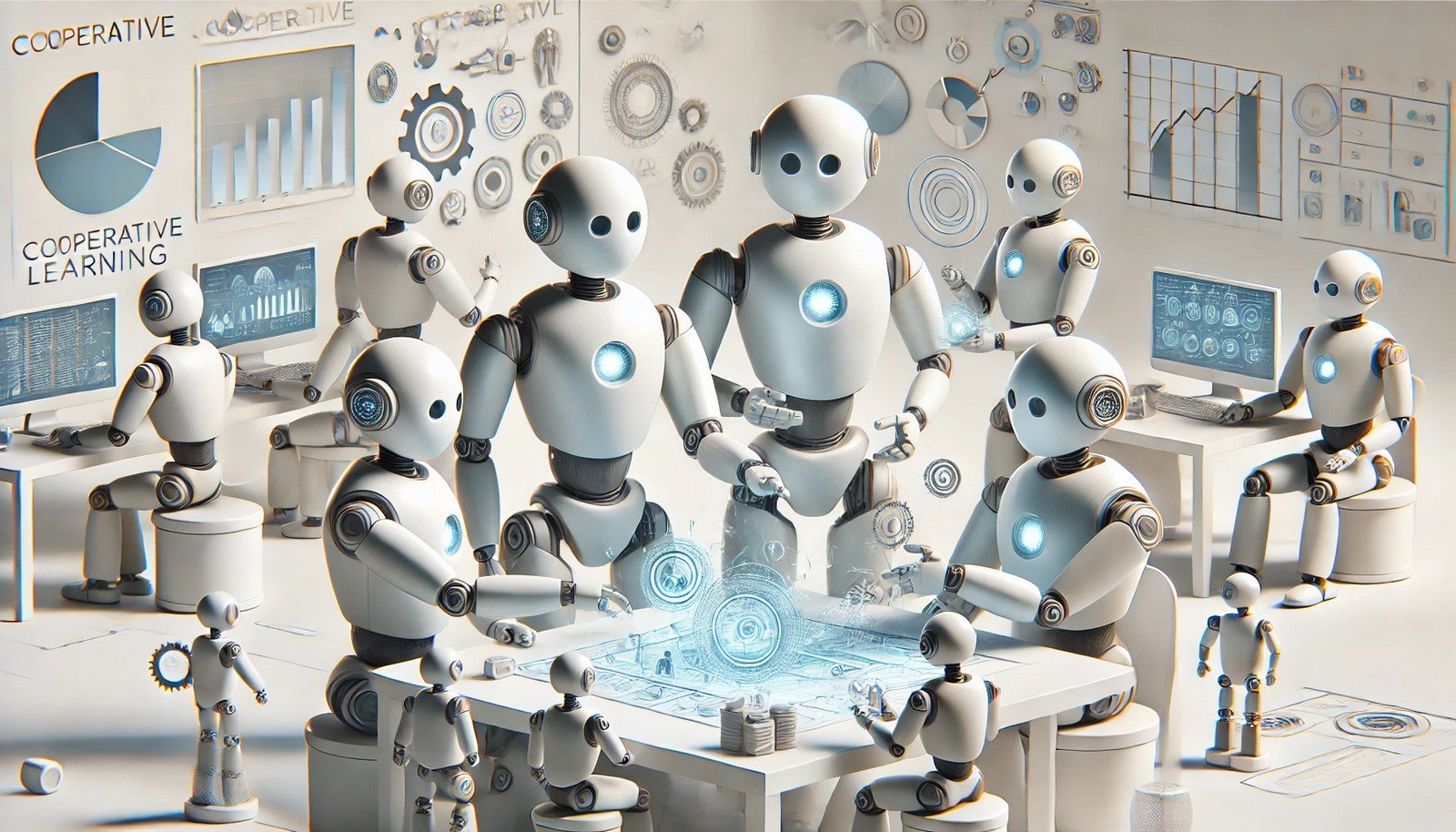Cooperative Learning

Quick Navigation:
- Cooperative Learning Definition
- Cooperative Learning Explained Easy
- Cooperative Learning Origin
- Cooperative Learning Etymology
- Cooperative Learning Usage Trends
- Cooperative Learning Usage
- Cooperative Learning Examples in Context
- Cooperative Learning FAQ
- Cooperative Learning Related Words
Cooperative Learning Definition
Cooperative learning is a teaching and AI methodology where participants work in groups to achieve shared objectives. It emphasizes individual accountability within group success, leveraging diverse skills and perspectives to solve complex problems. In AI, cooperative learning enables multiple agents to work together, sharing knowledge to optimize solutions in real-time. Key applications include multi-agent systems and collaborative robotics.
Cooperative Learning Explained Easy
Imagine a school project where everyone helps each other. Some are great at drawing, others at writing, and together they make an amazing poster. Cooperative learning is like that: different people or robots help each other, combining their strengths to succeed as a team.
Cooperative Learning Origin
Cooperative learning began as an educational strategy in the 1960s to enhance teamwork and mutual learning. As AI evolved, researchers applied cooperative learning principles to enable collaboration between intelligent agents.
Cooperative Learning Etymology
The term “cooperative learning” derives from "cooperation," where entities work together harmoniously to achieve common goals.
Cooperative Learning Usage Trends
In recent years, cooperative learning has gained traction within AI and machine learning. Its applications in multi-agent systems, education, and collaborative robotics have grown as systems benefit from cooperative dynamics, especially in complex problem-solving contexts such as logistics and social learning environments.
Cooperative Learning Usage
- Formal/Technical Tagging:
- Artificial Intelligence
- Multi-Agent Systems
- Educational Technology - Typical Collocations:
- "cooperative learning framework"
- "AI cooperative learning system"
- "team-based learning"
- "collaborative learning models"
Cooperative Learning Examples in Context
- Cooperative learning in classrooms encourages students to work in teams, solving problems together and improving each other’s understanding.
- In AI, autonomous drones use cooperative learning to survey large areas more effectively, sharing data with one another.
- Some robotic systems use cooperative learning to organize warehouse inventory, where robots communicate to avoid collisions and distribute tasks efficiently.
Cooperative Learning FAQ
- What is cooperative learning?
Cooperative learning is a teaching and AI approach where individuals or agents work collaboratively to achieve a shared goal. - How is cooperative learning applied in AI?
It's used in multi-agent systems where intelligent entities work together, sharing data and strategies to optimize group performance. - How does cooperative learning differ from traditional learning methods?
Unlike individual learning, cooperative learning focuses on team efforts, encouraging participants to support each other's understanding and success. - What are the benefits of cooperative learning in education?
It promotes critical thinking, social interaction, and a supportive environment that enhances learning outcomes. - How does cooperative learning benefit AI?
In AI, cooperative learning allows multiple agents to address complex tasks by sharing resources and knowledge in real time. - Can cooperative learning be used for robotics?
Yes, cooperative learning is foundational in collaborative robotics, where robots interact to accomplish tasks together. - What are typical cooperative learning activities?
Activities include group discussions, joint problem-solving tasks, and projects that require shared contributions. - Why is cooperative learning gaining popularity in AI?
It's effective in complex, multi-agent tasks and supports dynamic adaptability, making it valuable for real-world applications. - Does cooperative learning require supervision?
It can be either supervised or unsupervised depending on the task requirements and the participants' level of autonomy. - What are some challenges of cooperative learning in AI?
Coordination and data sharing between agents can be complex, especially in environments with high variability.
Cooperative Learning Related Words
- Categories/Topics:
- Multi-Agent Systems
- Collaborative Learning
- Team Dynamics
Did you know?
Cooperative learning models are transforming warehouse automation. Robots using cooperative learning algorithms can now autonomously organize, move, and store items by coordinating tasks and avoiding collisions, increasing efficiency and reducing errors in real time.
PicDictionary.com is an online dictionary in pictures. If you have questions or suggestions, please reach out to us on WhatsApp or Twitter.Authors | Arjun Vishnu | @ArjunAndVishnu

I am Vishnu. I like AI, Linux, Single Board Computers, and Cloud Computing. I create the web & video content, and I also write for popular websites.
My younger brother, Arjun handles image & video editing. Together, we run a YouTube Channel that's focused on reviewing gadgets and explaining technology.



Comments powered by CComment